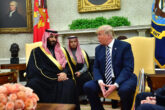December 15, 2017
Give Bad Faith a Chance in North Korea
Fruitless, drawn-out high-level negotiations could buy time for less diplomatic efforts to work.
Secretary of State Rex Tillerson said this week that the U.S. was “ready to talk” to North Korea. The White House and State Department walked back that statement, but Mr. Tillerson may be on to something. With time running out for a peaceful solution, the U.S. should pursue a high-level, bad-faith diplomatic initiative with Pyongyang.
The purpose would not be to reach an agreement but to buy time—to induce the North Koreans to temporarily slow their nuclear and missile programs, giving the U.S. more time to step up the sanctions, military defenses, and covert operations that can actually resolve the crisis.
For the past year, the Trump administration has largely rejected high-level diplomacy on the ground that Kim Jong Un will not make meaningful concessions. Instead, the U.S. has strengthened offensive and defensive military capabilities and launched a sophisticated campaign of economic warfare.
President Trump is right that North Korea is unlikely to make meaningful nuclear concessions, and that economic strangulation and stepped-up covert activities are needed to force change in Pyongyang. But even maximally tough sanctions take time to bite. It took nearly three years of sanctions pressure before Iran got serious about negotiating over its nuclear program in 2013. Sanctions will take at least that long to change North Korea’s strategic calculus, given the Kim family’s well-documented history of starving North Korea’s people as it perseveres through economic hardship.
Read the full commentary in The Wall Street Journal.
More from CNAS
-
Game Over?
The trade wargame suggests that sustained high tariffs could create leverage and urgency to spur action toward a productive restructuring of the international trade system....
By Emily Kilcrease & Geoffrey Gertz
-
Middle East Security / Energy, Economics & Security
Trump Inks $600 Bn Deal In Saudi Arabia | Musk, Blackrock CEO Flank Trump In Gulf VisitIn today's episode of India Global, U.S. President Donald Trump secured a $600 billion commitment from Saudi Arabia on Tuesday to invest in the United States. NDTV's Gaurie Dw...
By Daniel Silverberg
-
Energy, Economics & Security / Technology & National Security
Tariffs and Tech: An Uncertain RecipeHigher tariffs could prompt American cloud companies to shift more of their capital investments abroad....
By Pablo Chavez
-
Trump Tariffs: How Will U.S. Plans Reshape the Global Economy?
Donald Trump says he's already decided the tariffs he will impose on countries that export goods to America, including the United Kingdom. Channel 4 hears from Emily Kilcrease...
By Emily Kilcrease




